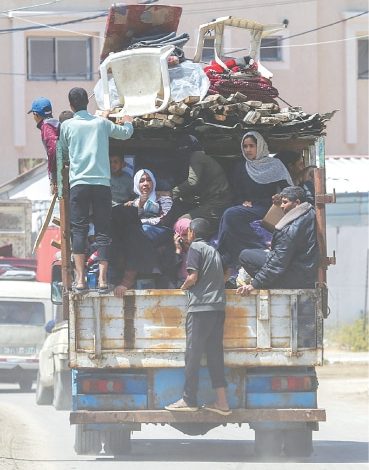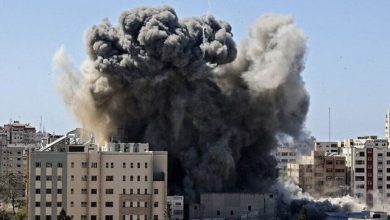Amid Rafah evacuation order, Hamas accepts truce proposal

RAFAH: Hamas on Monday said it had accepted a proposal for a truce in the seven-month-old war in Gaza, after Israel told Palestinians in Rafah to evacuate ahead of a long-threatened invasion of the city.
The Hamas announcement brought cheering crowds onto the street amid tears of happiness, chants of “Allahu Akbar” (God is greatest) and celebratory shooting in the air.
There was no immediate official response from Israel, and its close ally the United States said it was “reviewing” Hamas’s response.
Hamas in a statement said that its leader Ismail Haniyeh had informed mediators Qatar and Egypt “of Hamas’s approval of their proposal regarding a ceasefire agreement”.
A senior Hamas official said Israel must now decide whether it accepts or “obstructs” a truce in the Palestinian territory after seven months of war.
“The ball is now in the court of Israeli occupation, whether it will agree to the ceasefire agreement or obstruct it,” the official told AFP, requesting anonymity to discuss the negotiations.
Earlier in the day, Israel called on Palestinians to leave eastern Rafah, amid increasing global alarm about the consequences of an Israeli ground invasion of the southern Gaza city bordering Egypt.
Stephane Dujarric, spokesman for UN Secretary-General Antonio Guterres, condemned the order and said it would be “impossible to carry out safely”.
The evacuation call followed disagreement between Israel and Hamas over the Palestinian group’s demands to end the war, during weekend negotiations in Cairo.
Egyptian state-linked media said the talks stalled after a rocket attack claimed by Hamas’s armed wing killed four Israeli soldiers on Sunday.
Israeli Prime Minister Benjamin Netanyahu has vowed to send ground troops into Rafah regardless of any truce, defying international concerns.
‘Thousands’ leaving
Cairo’s foreign ministry warned in a statement of “grave humanitarian risks” for more than one million Gazans sheltering there and urged Israel to “exercise the utmost restraint”.
US President Joe Biden and Netanyahu spoke and Biden restated “his clear position” against an invasion of Rafah, the White House said. It also said the Israeli premier “agreed to ensure the Kerem Shalom crossing is open for humanitarian assistance for those in need”.
The two leaders spoke as Biden mounts a diplomatic offensive to get ceasefire talks between Israel and Hamas back on track, with Jordan’s King Abdullah II due at the White House for lunch.
The White House said Biden also briefed the Israeli leader on talks to free Israeli prisoners held by Hamas.
The United States said it was reviewing a response from Hamas to a ceasefire proposal as it renewed calls on Israel not to attack the packed Gaza city of Rafah.
“I can confirm that Hamas has issued a response. We are reviewing that response now and discussing it with our partners in the region,” State Department spokesman Matthew Miller told reporters.
CIA Director Bill Burns “is in the region working on this in real time”, Miller said.
UN human rights chief Volker Turk in a statement called Israel’s evacuation order on Monday “inhumane” and “contrary to the basic principles of international humanitarian and human rights laws”.
About 1.2 million people are sheltering in Rafah, the World Health Organisation says.
Gazan civil defence and aid officials said Israeli jets on Monday struck areas of Rafah, including Al Shuka and Al Salam, both of which had been told to evacuate.
The Palestinian Red Crescent said “thousands” of Gazans were leaving eastern Rafah.
‘Where can we go?’
Israel’s military in a statement urged eastern Rafah residents to head for the “expanded humanitarian area” at Al Mawasi, on the coast.
But aid groups said the Israeli-designated safe zone was not ready for such an influx.
“The area is already overstretched and devoid of vital services”, said Norwegian Refugee Council director Jan Egeland.
Asked how many people should move, an Israeli military spokesman said: “The estimate is around 100,000 people.” The Red Crescent said the designated evacuation zone hosts around 250,000 people, many of them already uprooted from elsewhere.
Palestinian man Abdul Rahman Abu Jazar, 36, said the area “does not have enough room for us to make tents” because it is already full. “Where can we go?” he asked.
Published in Dawn, May 7th, 2024





